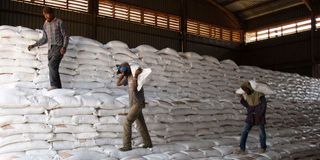Let’s take farming more seriously

Workers arrange bags of subsidised fertiliser at the National Cereals and Produce Board depot in Elburgon, Nakuru County. Cheap fertiliser, like many political promises, only exists in dreams.
I have lost my most prized Boran bull, the pride of my herd; a tall animal with a large frame and, therefore, the potential to carry a lot of meat. It was bitten by a snake and there was no saving it.
I keep asking myself, if the snake was so venomous as to kill such a big animal with one bite, what would have happened if it was a human being?
Granted, the animal was grazing in a wooded area where human beings are not frequent and snakes can coil there and kill small animals undisturbed. I also suspect that a negligent worker left the animal out in the bush overnight and the poor guy ran into a serpent out on the hunt.
The incident is a dramatic demonstration of the many uncertainties of Kenyan agriculture and the difficulty in managing risk in the farming business.
Food is the most expensive and difficult stuff to grow, especially natural, wholesome food free of chemicals. A lot of the food we eat is toxic because farmers are either uninformed or have corrupted morals and don’t give a hoot whether the stuff they serve kills us, so long as they make money.
I read complaints by a Kenyan who recently travelled to Scandinavia and how they steer clear of Kenyan Haas avocado; they are tasteless and horrible because they are harvested before maturity by greedy farmers. The fruit from South America and elsewhere is great, this person wrote.
Sending bad food to the market is of course inexcusable, but one sees how corruption and lousy policy has made farming, especially small-scale farming, an impossible business.
I’m not a good farmer, I don’t have green fingers. I’m just a stubborn fellow driven by a desire to grow food because if people like me don’t, who will? However, everything appears to have been done to make farming impossible.
I’m registered for cheap fertiliser, which I must use because the soil in parts of my farm is exhausted, with very little organic matter. I still pay around Sh6,000 for a bag of fertiliser, for planting and top dressing. Cheap fertiliser, like many political promises, only exists in dreams.
To treat the soil, I need manure for a start. Good manure in this part of the world comes from somewhere in Nyahururu and has to be transported across the planet to Makandune, on the boundary of Imenti and Tharaka.
I’m not sure how many acres you can treat with a small Isuzu truck, which goes for Sh50,000. If you want to farm on 50 acres, for instance, you are looking at very heavy expenditure and unless you are growing and processing the coca miracle flower, you can’t recover your investment.
Playing games
I’m surprised that we are playing games with our seeds. The fast-growing varieties that we plant in our climate are simply unavailable during the harvest.
In our zone, which is hot and dry, there are certain things that must happen. Most important of all, the scant rains must find the seed in the soil. The first rain is frighteningly heavy, followed by the kind of blistering sun that you could use to fry eggs.
At this point, you can bring your chair outside and watch your crops grow: growth is fast, furious and luxuriant. The maize season is three months, from planting to taking in the harvest. If you plant varieties suited to the long, luxurious seasons where moisture is in plenty, they will be eaten by termites before they grow to ankle length.
Traditional crop varieties, in my experience, are more nutritious and tastier. The traditional sweet potato is rich, with a high sugar content and tastes great. They are perennial and can also be propagated from the vine. It’s GM, bastard brother is soggy and is many times tasteless.
I’m willing to bet that the incidence and severity of stunted growth among children could be lowest in harsh, marginal areas where people still eat traditional foods. Take, for example, traditional pigeon peas, also known as mbaazi.
The taste is very distinct from the modern varieties and the nutritional value, from what I’m told, is also quite different. Our native pigeon peas is a superfood packed with equal measures of carbohydrates and proteins. It is a complete meal in itself, the only thing you need to add is a mix of vegetables and you are fine.
Foreign varieties of sweet potato are horrible and they have a terminator gene; they produce only once and you have to go back and buy fresh seed. The more modern varieties of pigeon pea, especially from Tanzania which have flooded the market and which are easier to grow and might produce more, I believe, are lower in nutritional value and don’t taste too good.
The problems of our agriculture are viewed as opportunities to make money by those with access to power. This is what will surely kill Kenya. I think it is fine to import food to deal with shortages, but the bigger priority is to single-mindedly fix our broken agriculture and have it make sense for reluctant farmers like me.





